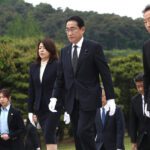Global Courant 2023-05-07 11:05:32
The coronation of King Charles III of England, held yesterday in London, was undoubtedly a kind of dystopia in reality, a ceremony with almost medieval airs —given the 12-century age of the British monarchy—, broadcast on social networks, in texts, videos and audios multiplied by the second, with praise, congratulations, criticism and calls to put an end to a succession by lineage, not at all democratic, which in turn is the head and symbol of one of the most solid institutional democracies.
The death of Queen Elizabeth II last September put the then-Prince Charles and his partner, the now Queen Consort Camila, in the spotlight. But not only that, but also the turbulent story of the heir’s marriage to Diana, named Princess of Wales by virtue of such a union. They separated in 1996, and in 1997 she died in a traffic accident. Various narratives and television series villainized Carlos, who holds the record for being the oldest king at the time of his coronation and for the longest wait for such a moment.
Outside of pink gossip and in a more institutional sphere, the British crown reigns, but does not govern, due to its parliamentary nature. The now king is a symbol of the State, of its union and continuity, but the government of the United Kingdom is exercised by a prime minister appointed by a Legislative branch elected by citizen vote. Carlos III faces criticism for the cost of the monarchy and its privileges, although the majority of British citizens still support its continuation, but with lower percentages among the young population.
In the long run, the great challenge of the British State is to recover economic leadership, hit hard after leaving the European Union, as well as to ensure the well-being of its citizens and also to strengthen the integration of the Commonwealth of Nations, territories ex-colonial groups covering more than 50 countries. Some of them are considering following the example of Barbados, which declared itself a sovereign and independent republic in 2021, in pursuit of the same goals. Colonial remnants contribute to reluctance in many cases.
On the other hand, the United Kingdom is a strong promoter of democratic development, both in those territories and in developing countries. In fact, it was there that great thinkers arose who consolidated concepts such as the division of powers as a balancing mechanism in favor of respect for the rights of citizens. John Locke, Thomas Hobbes, Adam Smith or Thomas More are some of those philosophers who shaped the principles of liberal democracy, not without dramatic processes adversely affected by past monarchs.
In any case, the questions about the monarchy are something that the British themselves must settle over time. However, there are similar questions in other latitudes where there is no throne or crown, but there are crude autocrat apprentices, who want to twist the laws and powers of the State in their favor and that of their relatives. Presidents elected for a legally limited period seek to be petty kings without tradition or controls, because they are only governed by their whims and their courtiers. At least Carlos III reigns, but does not govern.
Of kings and democracies
America Region News ,Next Big Thing in Public Knowledg








